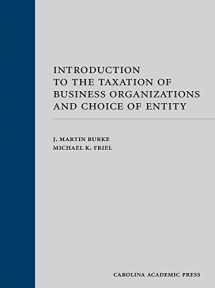
Introduction to the Taxation of Business Organizations and Choice of Entity (LOOSELEAF)
Book details
Summary
Description
This casebook provides an introduction to the taxation of business organizations, highlighting the most significant tax similarities and differences between and among the tax regimes of Subchapters C, K, and S of the Internal Revenue Code as they apply to corporations, partnerships, and limited liability companies. To that end, the authors have designed many of the chapters of this casebook to compare the tax treatment of these entities and their owners with respect to major events in a business’s life, e.g., formation, operation, distributions, and transfers of ownership interests. In those chapters, they have utilized common problems sets enabling students to compare the differing tax consequences of these business entities. Because there are tax issues unique to each of the common business entities noted above, the authors have included additional chapters focusing on those issues. To accommodate students seeking to delve more deeply into certain issues and to provide teachers additional options, the authors have included in an extensive appendix a series of Notes elaborating on various specialized topics pertinent to the choice of business entity. As with their other casebooks, the authors have structured this book with self-contained chapters featuring a set of problems, assignments to pertinent Code and Regulation provisions, an overview of the chapter topic, edited cases, and administrative materials as well as self-assessment tools—measurable learning objectives and a vocabulary of tax terms and phrases.


We would LOVE it if you could help us and other readers by reviewing the book
Book review



